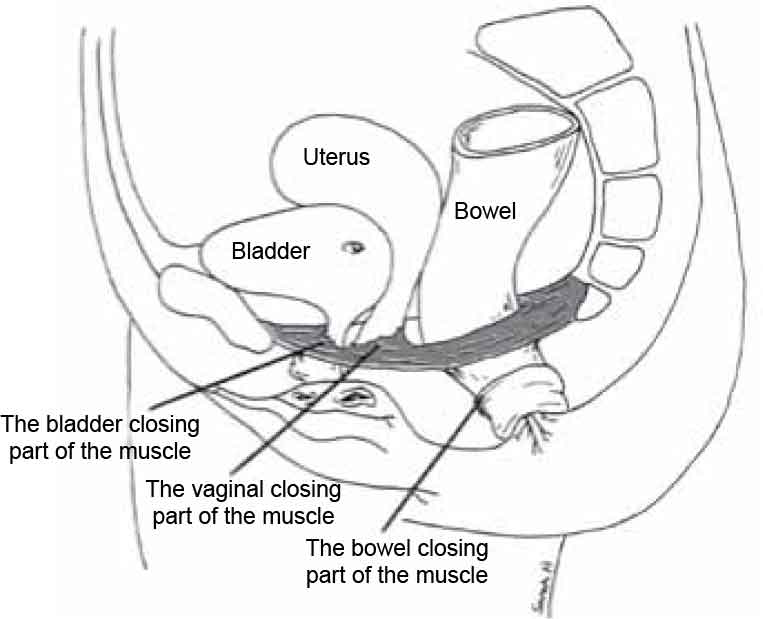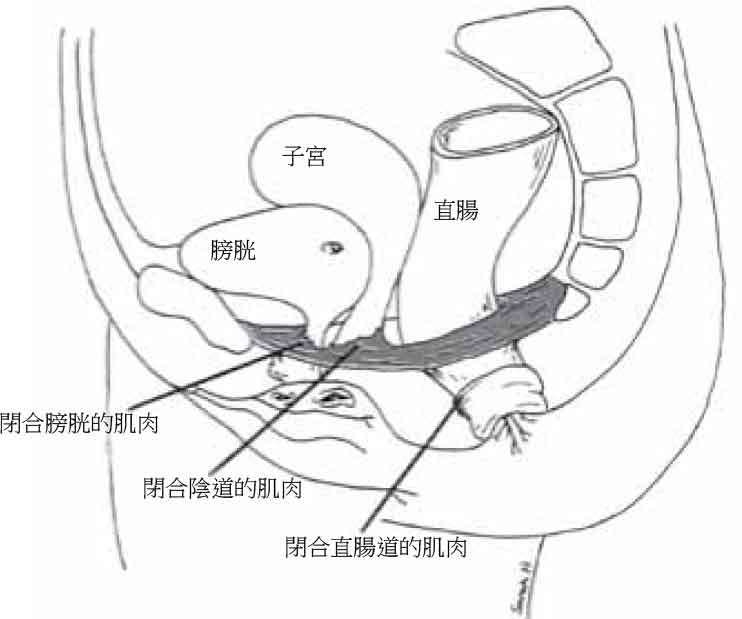| Women who have even just one baby are nearly three times more likely to leak urine and wet themselves, than women who have not had a baby. The more babies you have, the more chance there is that you will leak urine and wet yourself. | 即使只是生過一個孩子的女性,漏尿和尿濕褲子的機會比未生過孩子的女性幾乎大三倍。孩子生得越多,漏尿和尿濕褲子的可能性越大。 |
Why do you leak urine after having a baby?When the baby moves down through the birth canal, it stretches the nerves and muscles that keep the bladder shut. These are called the pelvic floor muscles, and they can sometimes be left weak, and not able to keep the bladder from leak ing. Leaking happens mostly when you cough, sneeze, lift or do exercise. It is rare for the bladder to be hurt during birth, but the muscles and nerves often are, and you need to do pelvic floor muscle training to help the muscles get strong again. | 為什麼生孩子後會漏尿?當胎兒通過產道下移時,會拉扯保持膀胱關閉的神經及肌肉。這些肌肉叫作骨盆底肌群,它們有時會變弱,並因此無法防止膀胱的尿液漏出。當你咳嗽,打噴嚏,提物或做運動時最可能出現漏尿。生孩子時損傷膀胱很罕見,但肌肉及神經常常會受損傷,因此你需要做骨盆底肌肉鍛練,幫助這些肌肉重新變得強健。 |
Will this leaking go away by itself?If you have any leaking, it will not go away if you just ignore it. Leaking is likely to stop if you train your pelvic floor muscles, to help get their strength back. If you don’t get pelvic floor muscle strength back after each baby you have, you may start wetting yourself, as the pelvic floor muscles get weaker with age. | 漏尿會自己消失嗎?如果你有漏尿而不去管它,它是不會自動消失的。如果你鍛練骨盆底肌肉來幫助它們恢復力量,漏尿就有可能停止。如果你在每次生完孩子之後不幫助骨盆底肌肉恢復力量,就可能會開始尿濕褲子,因為隨著年齡增長,骨盆底肌肉會變得更弱。 |
How does my bladder work?The bladder is a hollow muscle pump. It fills slowly from the kidneys, and can hold at least one and a half to two cups of urine (300 to 400mls). The bladder outlet tube is kept closed by the pelvic floor muscles. When the bladder is full and you decide to pass urine, the pelvic floor muscles relax when you sit on the toilet, and the bladder squeezes the urine out. Then the same “fill and empty” cycle begins again. | 我的膀胱如何運作?膀胱是一個中空的肌肉泵,慢慢會被從腎臟排出的液體充滿,裡面至少容納1.5至2杯尿液(300至400毫升)。骨盆底肌肉將膀胱的排泄管閉合。當膀胱充盈需要排尿時,你坐在馬桶上骨盆底肌肉就會放鬆,然後膀胱將尿液擠出。這樣的“充盈 - 排空”周而復始。 |
What do my pelvic floor muscles do?See the picture of the pelvic floor. The pelvic floor muscles do a number of things, they:
| 我的骨盆底肌肉有甚麼作用?參閱骨盆底圖片。骨盆底肌肉有多種作用,它們:
|
 |  |
What happens if my pelvic floor muscles are weak after having my baby?
| 如果我的骨盆底肌肉在生孩子之後變弱會有甚麼後果?
|
What can I do to stop these things from happening?
| 我可以做些甚麼來防止這些問題出現?
|
How can I care for my weak pelvic floor muscles?The birth of a baby might have stretched your pelvic floor muscles. Any ‘pushing down’ actions in the first weeks after the baby’s birth might stretch the pelvic floor muscles again. You can help to protect your pelvic floor muscles by not pushing down on your pelvic floor. Here are a few ideas to help you.
| 我怎樣才能護理好衰弱的骨盆底肌肉?分娩可能扯傷了你的骨盆底肌肉。嬰兒出生後最初幾周,任何“向下推”的動作或會再次拉扯骨盆底肌肉。你可以透過不向下推骨盆底來保護你的骨盆底肌肉。這裡有一些建議會對你有幫助。
|
Where are my pelvic floor muscles?The first thing to do is to find out which muscles you need to train.
If you don’t feel a distinct “squeeze and lift” of your pelvic floor muscles, or if you can’t stop your stream of urine as talked about in Point 3, ask for help from your doctor, physiotherapist, or continence nurse advisor. They will help you to get your pelvic floor muscles working right. Even women with very weak pelvic floor muscles can gain from pelvic floor muscle training. | 我的骨盆底肌肉在哪裡?首先要找出你需要鍛練哪些肌肉。
如果你沒有明顯感覺到骨盆底肌肉“收緊及提起”,或者如果你不能像第3點提到的那樣停止排尿,就要向你的醫生,理療師或排便科護士顧問尋求幫助。他們會幫你令骨盆底肌肉正常運作。骨盆底肌肉非常弱的女性將得益於骨盆底肌肉鍛練。 |
How do I do pelvic floor muscle training?Now that you can feel the muscles working—
While doing pelvic floor muscle training—
| 我如何做骨盆底肌肉鍛練?現在你可以感覺到肌肉在運動—
進行骨盆底肌肉鍛練時—
|
Do your pelvic floor muscle training wellFewer good squeezes are better than a lot of half hearted ones! If you are not sure that you are doing the squeezes right ask for help from your doctor, physiotherapist, or continence nurse advisor. | 認真做骨盆底肌肉鍛練認真地做幾次收緊鍛練比馬馬虎虎地做很多次效果好!如果你不確定你的收緊鍛練做得是否正確,就要向你的醫生,理療師,或排便科護士顧問尋求幫助。 |
Make The Training Part Of Your Daily LifeOnce you have learnt how to do pelvic floor muscle squeezes, you should do them often. Every day is best, giving each set of squeezes your full focus. Make a regular time to do your pelvic floor muscle squeezes. This might be when you:
It’s a good idea to get into the lifelong habit of doing one set of pelvic floor muscle exercises every time you go to the toilet, after passing urine or opening your bowels. | 令鍛練成為你日常生活的一部份你一旦學會了如何做骨盆底肌肉收緊鍛練,就要經常進行鍛練。最好是每天都全心全意地做每一組鍛練。你應該定時做骨盆底肌肉收緊鍛練。可以於以下時間做:
建議養成每次去廁所大小便後都做一組骨盆底肌肉運動的好習慣,並且終生如此。 |
What if things don’t improve?Pelvic floor muscle damage may take up to six months to get better. If things are not getting better after six months, speak to your doctor, physiotherapist or continence nurse advisor. | 如果情況沒有改善怎麼辦?骨盆底肌肉受損可能需要長達6個月才能好轉。如果6個月之後情況還未好轉,就要告訴你的醫生,理療師或排便科護士顧問。 |
Also ask your doctor for help if you notice any of the following:
| 如果你留意到以下任何情況亦要向你的醫生尋求幫助:
|
Seek helpQualified nurses are available if you call the National Continence Helpline on 1800 33 00 66* (Monday to Friday, between 8.00am to 8.00pm Australian Eastern Standard Time) for free:
If you have difficulty speaking or understanding English you can access the Helpline through the free Telephone Interpreter Service on 13 14 50. The phone will be answered in English, so please name the language you speak and wait on the phone. You will be connected to an interpreter who speaks your language. Tell the interpreter you wish to call the National Continence Helpline on 1800 33 00 66. Wait on the phone to be connected and the interpreter will assist you to speak with a continence nurse advisor. All calls are confidential. Visit bladderbowel.gov.au or continence.org.au/other-languages * Calls from mobile telephones are charged at applicable rates. | 尋求幫助如果你致電國家排便節制熱線,有資質的護士會接聽你的電話1800 33 00 66* (週一至週五,澳大利亞東部標準時間8:00am—8:00pm)。
如果你在講英語或者理解上有困難,你可以透過撥打13 14 50獲取免費電話傳譯服務以接通國家排便節制熱線。電話會用英語接通,因此請說明你要講的語言並且不要掛機。你會被連接到一個講你母語的傳譯員。告知傳譯員你想要致電國家排便節制熱線,電話是1800 33 00 66。待電話接通後傳譯員會幫助你與排便節制護理顧問對話,所有的來電均保密。 請登陸:bladderbowel.gov.au或者continence.org.au/other-languages * 用手機打出會收取相應費用。 |
One In Three Women Who Ever Had A Baby Wet Themselves in Cantonese
三分一生過孩子的女性會小便失禁
Browse and download our factsheets in Cantonese
Last Updated: Wed 19, Jul 2023
Last Reviewed: Tue 17, Mar 2020

